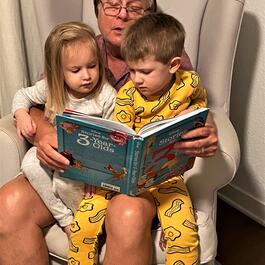
"Getting baby boomers more involved with their grandkids" - Gramps Jeffrey
Gramps Jeffrey has 4 kids and 6 grandchildren and believes baby boomers have a unique role to play in raising their grand kids. To deliver on this, he wrote a children's book, “I Don’t Want to Turn 3”, to explore the interaction that is happening between families in just about every household in the world. I found this conversation really intriguing as I tried to better understand Gramp's value. On some levels it made perfect sense: wanting to leverage the knowledge from prior generations, the importance of grandparents instilling knowledge in kids, the value of reading to kids, etc.. However, I wanted to understand what was really underneath this. Why was it that baby boomers as grand parents, in particular, were so important in this role? I think even Gramps struggled a bit at times to articulate why this value was so important to him, but it was rooted in trying to help improve the world. As we dug more into the conversation we started to uncover some interesting insights though that I think explained it. It seemed like there was some regret that Gramps had, where some in his generation (and prior generations) didn't value family enough. It wasn't that they didn't love their family, but the focus was so rigid on working and providing for your family, that it often resulted in missing out on the little moments that can be so important (e.g., soccer games, dance recitals, etc.). Gramps went even further to explain there was some guilt as well from his generation. He realized there were some mistakes made in how they approached the world and might have contributed to some of the divisiveness we have today and he felt an obligation to try and fix that. As Gramps said it, once he retired, he started to think more about his legacy and reflected on what he had done to make the world a better place. His belief is that the current generation of kids (through age 10) have a unique opportunity to be the greatest generation ever, given all the technology and knowledge at their finger tips. So Gramps wants to do his part to teach them about the mistakes his generation made, so kids can be better prepared to avoid them and live up to their potential--and maybe finally fix the deep social problems we have in the world. It is an ambitious goal and as we discussed there are some risks (e.g., are baby boomers really best suited to teach the younger generation, can these lessons even be taught or do they have to be experienced, etc.). But overall I admire that Gramps saw a problem and is doing his part to try and address it, while also making the most of the time he has with this family.
From "What's the value?"




Comments
Add comment Feedback